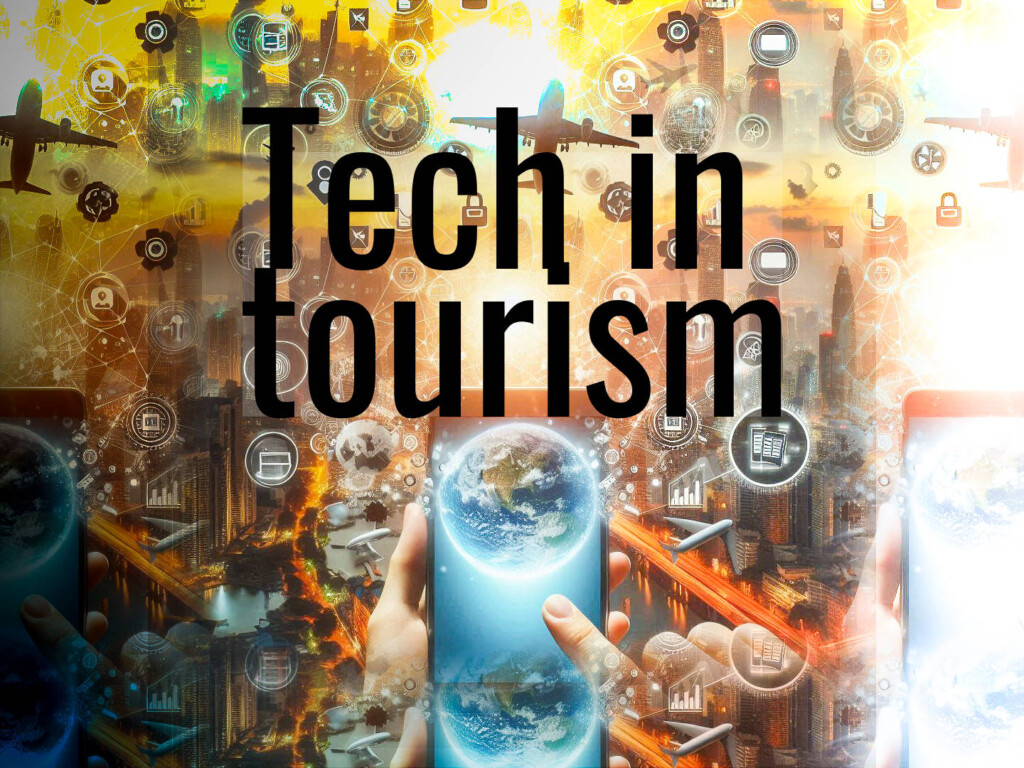How are emerging technologies transforming the travel & tourism industry?

How are emerging technologies transforming the travel & tourism industry?
It’s a “Good Tourism” Insight Bites question.
Your correspondent put the question to the travel & tourism stakeholders in the “GT” network, inviting responses of no more than 300 words. (You too can join the “GT” network. Register.)
Thanks to the four respondents — professors, professionals, practitioners — who took the time to share their thoughts on the question. Their answers appear in the order received.
And thanks to Frédéric Dimanche and Kelley McClinchey for their “GT” Insight BiteX.
Bites menu
- Social media influencers are replacing travel agents
- The optimal balance between tech and the human touch
- Bhutan’s digital identity technology to transform tourism
- For sustainability’s sake, tech must come with a change of mindset
- “GT” Insight BiteX (‘X’ is up to you)
- As cruising booms environmental concerns intensify
- What do you think?
- Featured image (top of post)
- Previous “GT” Insight Bites
Social media influencers are replacing travel agents
Greg Richards, Professor, Breda University of Applied Sciences; Professor, Tilburg University, Netherlands
Some of the biggest changes in the travel & tourism industry are coming not from advances in hardware, but in software; particularly social media.

Social media platforms such as TikTok and Instagram are influencing travel trends, replacing travel agents and tour operators.
The ability of TikTok to highlight urban hotspots has created ’TikTok queues’ in cities such as Amsterdam, creating a need for professional queue managers.
Different platforms can be used to target specific groups. Holidu’s Generational Travel Index measures the popularity of cities using Instagram hashtags for Millennials, and TikTok hashtag views for Gen Z.
Research on the youth travel market has shown a consistent rise in the role of social media over the past 20 years. For those under 30, social media is now often the first stop in travel searches and an increasingly important influence on destination choice.
These technologies are providing opportunities to ‘curate’ tourism experiences, with consumer choice increasingly being driven by algorithmic curation and TripAdvisor rankings.
Alongside the growth in algorithmic curation, influencers are becoming travel curators, taking over the role of the travel agent.
For example, social media influencer Mohsin Amdaouech has set up the ‘travel experience and community’ #nietnadenkengewoondoen (Dutch for “don’t think, just do it”) to provide adventures for like-minded people. Participants often come from ethnic minority groups who might be hesitant to join a traditional tour group.
New technologies can also attract new markets!
The optimal balance between tech and the human touch
Mahiru Fernando, General Manager, Khiri Travel Sri Lanka
As we enter the era of Big Data and Artificial Intelligence (AI) among other technological advancements, the travel & tourism industry is no exception in terms of the need to adapt.

In almost every aspect of the industry we can already see rapid tech-powered transformations: From AI chatbots and virtual assistants to service robots and smart hotel rooms; booking platforms to digital wallets and blockchain payment platforms; virtual reality (VR) tours to augmented reality (AR) tours; analytical tools that predict trends to AI-assisted marketing and management tools.
Having had the privilege of being born in the early 1990s, I spent my childhood playing cricket outdoors and playing electronic games indoors; witnessing the evolution from basic cartridge games to the PlayStation. I believe I enjoyed an optimal balance of formative experiences.
Likewise, even with the pendulum swinging more rapidly towards technology, I believe the optimum level for travel & tourism is somewhere in the middle, balancing the efficiency of technology with the human touch.
A starting point for this is to remember that technology is here to enhance human capacity, not to replace it. With this in mind, we can and should certainly use technology for routine tasks while entirely focusing our human touch on more important aspects of the business; those that require an authentic emotional intelligence over the artificial variety.
Our industry is filled with customer service touchpoints which require empathy and human intelligence. If we can save our human efforts for those tasks, while using technology for the more straight-forward processes, I believe the optimum balance lies somewhere there.
[Khiri Travel is a valued “GT” Partner.]
Bhutan’s digital identity technology to transform tourism
Dorji Dhradhul, author and creativist, Bhutan (former Director General, Bhutan Tourism)
I’m excited to share that Bhutan became the first country (at the national level) to implement a digital identity system in October 2023. I like to believe that the National Digital Identity (NDI) has the potential to transform the travel & tourism industry significantly.
Imagine arriving in Bhutan and experiencing a simplified border control process. Tourists could pre-register and verify their identities online, streamlining visa processing and customs checks. Upon arrival, biometric verification, such as facial recognition, would expedite entry and exit, ensuring a smooth transition through the borders.
The NDI system could also enhance security and safety. A centralised database of tourist identities would allow authorities to manage emergencies more effectively. In cases of natural disasters or health crises, the system could provide immediate access to accurate traveller information, facilitating swift and coordinated responses.
Tourists’ experiences could become highly personalised. The system might offer tailored recommendations for activities, dining, and accommodations based on individual preferences. With seamless integration with local service providers, tourists could enjoy real-time updates and easy bookings.
Access to services could be streamlined. Tourists might use their digital IDs for hassle-free hotel check-ins, vehicle rentals, and public transport. NDI would reduce the need for multiple tickets and simplify transactions across various attractions and services.
Additionally, integrating tourist data into NDI could offer Bhutan valuable insights into travel patterns to support better planning and management of tourism resources, promoting sustainable practices, and preserving the country’s cultural and natural heritage.
In summary, the implementation of a National Digital Identity service in Bhutan could enhance travel efficiency, personalisation, and safety while supporting sustainable tourism. This forward-thinking approach would blend Bhutan’s rich cultural heritage with cutting-edge technology, setting a new standard for global travel.
For sustainability’s sake, tech must come with a change of mindset
Samut Bunnag, Junior Marketing Manager, LightBlue Consulting, Thailand
In the travel & tourism industry, emerging technologies, led by artificial intelligence (AI), are starting to play a pivotal role.

Technology optimises everything from booking engines to customised travel experiences, enabling companies to predict and adapt to traveller preferences and optimise their operations with precision.
Technology can also be applied to food production and reducing food waste. However, as we harness these technologies, it is crucial to remember that: “Technology itself is not a miracle. It has to come with a change of mindset”. Benjamin Lephilibert, CEO of LightBlue Consulting, often says this.
This is crucial because technology alone can’t make the sustainable changes we need. It’s the human element — the change in mindset — that makes these solutions stick and multiplies their impact.
In fact, there was a recent article by Cathrine Jansson-Boyd at Psychology Today who found that getting people to consciously think about food waste for six weeks can change behaviours in the long term.
At LightBlue Consulting, we’re equipping chefs and their staff with practical, versatile tech and the right mindset to reshape both operations and attitudes. This isn’t about plugging in a system and walking away. It’s about igniting a sustainable cultural revolution among the people who work in kitchens.
Why does this matter?
Today’s traveller isn’t just buying a getaway, they’re investing in values. They choose destinations and companies that reflect their environmental consciousness. They look for genuine commitments to providing sustainable accommodation and dining.
In conclusion, while AI and other technologies make our lives easier and are instrumental for the hospitality industry to adapt in the changing landscape, it’s the evolving attitudes towards responsible tourism that truly define the next chapter for travel.
“GT” Insight BiteX (‘X’ is up to you)
The “Good Tourism” Blog offers a great opportunity to any travel & tourism stakeholder who wishes to express themself in writing for the benefit of “GT’s” open-minded readers.
To feature in the next “GT” Insight Bites compilation, send no more than 300 words (300 words or fewer (</=300 words)) on any tourism-related idea or concern you may have.
Don’t use AI. if you lack confidence in writing in plain English, “GT’s” publisher will personally help with copy editing. “GT” doesn’t judge. “GT” publishes.
Send your “GT” Insight Bite and picture to [email protected].
As cruising booms environmental concerns intensify
Frédéric Dimanche, Toronto Metropolitan University, Canada and Kelley A McClinchey, Wilfrid Laurier University, Canada
The 2024 cruise ship season in British Columbia, Canada began with Norwegian Bliss docking on April 3, marking the first of 318 scheduled ship arrivals in Victoria. This follows a record 970,000 passengers in 2023, with more expected this year.

After the severe impact of the 2020 pandemic, the cruise industry has rebounded strongly due to high consumer demand and innovation, becoming one of the fastest-growing sectors.
An industry report highlights a significant post-COVID recovery, with two million more passengers in 2023 compared to 2019, and forecasts 35 million in 2024. The sector is experiencing unprecedented growth, with new mega-ships like Royal Caribbean’s Icon of the Seas and MSC’s MSC World Europa.
Cruise Lines International Association reports that 82% of previous cruisers would cruise again, prompting companies to offer innovative itineraries and onboard activities. Younger generations (Gen X, Millennials, and Gen Z) are replacing Boomers, forming a significant portion of the clientele. Solo and multi-generational family travel is rising, leading to innovative cabins, activities, and dining.
However, despite some economic benefits and the appeal of cruises, their environmental (and social) impacts remain very problematic. The industry’s revival faces substantial environmental challenges often overlooked by the public. Cruise ships contribute significantly to marine pollution, with high emissions impacting port cities and sensitive ecosystems.
Despite improvements like using liquefied natural gas (LNG) and electric shore power, critics argue the industry engages in greenwashing. Some destinations (e.g., Amsterdam and Venice) impose restrictions on cruise ships due to these concerns.
The cruise industry must enhance its sustainability efforts beyond merely meeting regulations. Consumers and travel agents must be better informed, and local authorities should demand greater accountability and proactive measures from cruise lines to address their environmental impact.
This “Good Tourism” Insight Bite summarises our article for The Conversation.
What do you think?
In a comment below share your own thoughts about technology and travel & tourism. SIGN IN or REGISTER first. (After signing in you will need to refresh this page to see the comments section.)
Or write a “GT” Insight or “GT” Insight Bite of your own. The “Good Tourism” Blog welcomes diversity of opinion and perspective about travel & tourism, because travel & tourism is everyone’s business.
This is an open invitation to travel & tourism stakeholders from any background to share their thoughts in plain English with a global industry audience.
“GT” doesn’t judge. “GT” publishes. “GT” is where free thought travels.
If you think the tourism media landscape is better with “GT” in it, then please …
Featured image (top of post)
Image assisted by AI (Copilot).
Previous “GT” Insight Bites
- What does it mean to be critical of tourism?
- What constitutes ‘progress’ for travel & tourism in 2024?
- Considering a career in tourism? Important things you should know in 2024
- What did tourism learn from the COVID-19 pandemic?
- In 2024, what are the best opportunities for tourism over the next five years?
- Tourism’s biggest challenges & threats over the next five years to 2028
- On empowerment, promotion, and the power of expression
- On enrichment, repatriation, the double-edged blade, and war
- On tourism technology, progress, and local benefit-sharing
- Hey, travel & tourism, are you ‘neocolonialist’?
- Who’s the new boss? Asia Pacific tourism industry association seeks leader
- ‘The hospitality industry offers a great career.’ Really?
- Cruise ships: Blessing or blight?
- Tourist vs traveller: What’s the difference?
- The heads of finance, operations, and PR walk into their boss’s office …
- Yes, Tourism Minister
- What are tourism’s biggest challenges & threats over the next five years?
- ‘Tourism is built on the backbone of white supremacy’. What do you think?
- Really, what’s the difference? ‘Sustainable tourism’ vs ‘regenerative tourism’
- Want a career in tourism? Important things you should know
- Diverse perspectives on travel & tourism and a fairer world
- Diverse perspectives on economic degrowth and tourism
- Diverse perspectives on visitor dispersion






